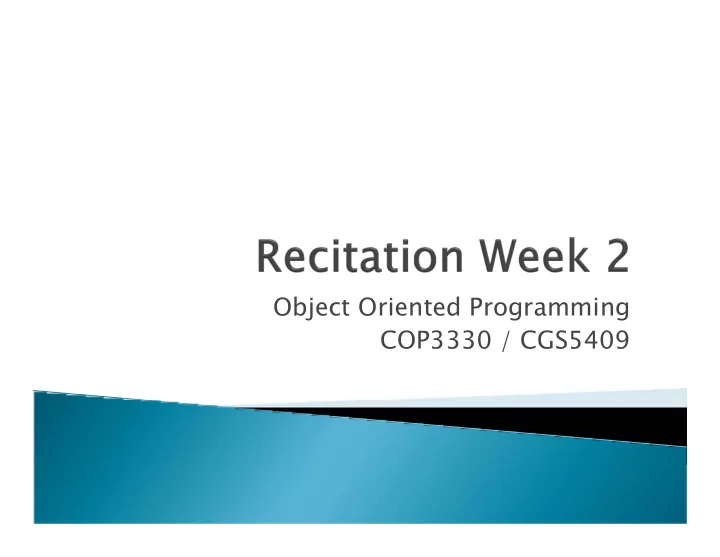

Object Oriented Programming COP3330 / CGS5409
Assignment Submission Overview Compiling with g++ Using Makefiles Misc. Review
Programs submitted through course web page http://www.cs.fsu.edu/~jestes/cop3330 Link: “Click me, if you dare…”
Submit source files only! ◦ Only .cpp and .h files ◦ DO NOT INCLUDE BINARIES! ◦ If more than one file, upload each individually Use FSU SN ◦ Social Security number will not work Require additional submission passwords ◦ NOT THE SAME AS FSU/CS PASSWORDS!
Feedback from submission: ◦ (1) a directory listing of files submitted for that assignment so far ◦ (2) a copy of the file just submitted Do not e-mail asking for confirmation! ◦ Verify submission with above methods
The FSU SN is typed with dashes (i.e. AB3- 45-6789, not AB3456789) Passwords are all 8 characters long The passwords do not contain any instances of the numeric digits 0 or 1 Hang on to this password, it will be needed all semester!
Make sure to follow all submission instructions carefully Homework submitted by e-mail to the instructor or me will NOT BE GRADED! Can re-submit an updated file that was previously submitted ◦ Will overwrite previous attempt
One late day submission is allowed (with a letter grade deduction) on assignments After that time, course web site WILL NOT accept submissions MAKE SURE TO SUBMIT BY THIS TIME
Assignment Submission Practice Option on the submission page called "Assignment 0“ http://ww2.cs.fsu.edu/~jestes/cop3330/sub mit3330/html/primary_class_page_w_counter .html Will not be graded
The base command for the Gnu C compiler is "gcc" The base command for the Gnu C++ compiler is "g++"
To compile a program that is in a single file, the easiest compilation uses the command format: g++ <filename> Where the filename ends with ".cpp“ Example: g++ prog1.cpp
To invoke the Compile stage, which translates source code (.cpp files) into object code (.o files), use the -c flag. Format: g++ -c <filename> To name a target (something other than the default filename, use the -o flag. Format: g++ -o <target_name> <remainder of command>
g++ -o yadda.o -c fraction.cpp ◦ This command invokes just the compile stage on fraction.cpp, but names the object code file "yadda.o" (instead of the default "fraction.o"). g++ -o bob.exe circle.o main.o ◦ This command links the two object code files ("circle.o" and "main.o") into an executable, called "bob.exe" (instead of the default "a.out"). g++ -o myProgram thing.cpp main.cpp ◦ This command compiles and links (since -c not used) the code files "thing.cpp" and "main.cpp" together into the executable program called "myProgram".
Source code is just text! For the purposes of assignments, ANY text editor can be used to Practice with at least one Unix text editor create code files ◦ For unix beginners, "pico" is recommended, due to easy learning curve. ◦ Emacs, Vim, MUCH more powerful
Understand how to log into both CS machines: ◦ linprog.cs.fsu.edu ◦ program.cs.fsu.edu Use SSH (Secure SHell) client to login Files created on a windows machine can be FTP-ed to CS accounts with the SFTP feature built into the SSH software
Usage: sftp [username@]hostname get filename - retrieve remote file put filename - upload local file Standard Unix commands: ◦ cd, ls, pwd, chmod, rename, rm, mkdir, rmdir, help, quit Alternatively, GUI File Managers ◦ WinSCP - Free Windows client with SFTP capability ◦ FileZilla - Open source cross-platform GUI client
Unix system has what is called a ‘make’ utility Configuration file to assist with compilation Simple text file, should be named either ‘makefile’ or ‘Makefile’
Idea of the ‘target’ ◦ What is able to be ‘made’? Dependency list ◦ What needs to be re-made each time? Command list, and formatting ◦ i.e. it must must be preceded by a single ‘tab’ character Extra targets, like ‘clean’, for cleanup ◦ target that lists a cleanup command (like the remove ‘rm’ command) More than one target ◦ placing a target like ‘all’ at the top, and listing the executables made by the file as the dependency list
# This is a comment line # Sample makefile for fraction class frac: main.o frac.o g++ -o frac main.o frac.o main.o: main.cpp frac.h g++ -c main.cpp frac.o: frac.cpp frac.h g++ -c frac.cpp clean: rm *.o frac
frac: main.o frac.o g++ -o frac main.o frac.o Specifies ‘frac’ as the target Depends on main.o and frac.o If either of these files changed since the last build, then ‘frac’ must be rebuilt Links two object code files together into a target executable called ‘frac’
main.o: main.cpp frac.h g++ -c main.cpp Specifies how to built the target ‘main.o’ Depends on main.cpp and frac.h If either file changes, main.o must be rebuilt Uses normal g++ commands for the compile stage
Any section can be invoked specifically with the command: make <target_name> For instance, to build only the ‘frac.o’ target, use: make frac.o
clean: rm *.o frac The target name is ‘clean’ Executes the remove command (‘rm’) Removes the object code file(s) and the executable(s) from the current directory
Recommend
More recommend